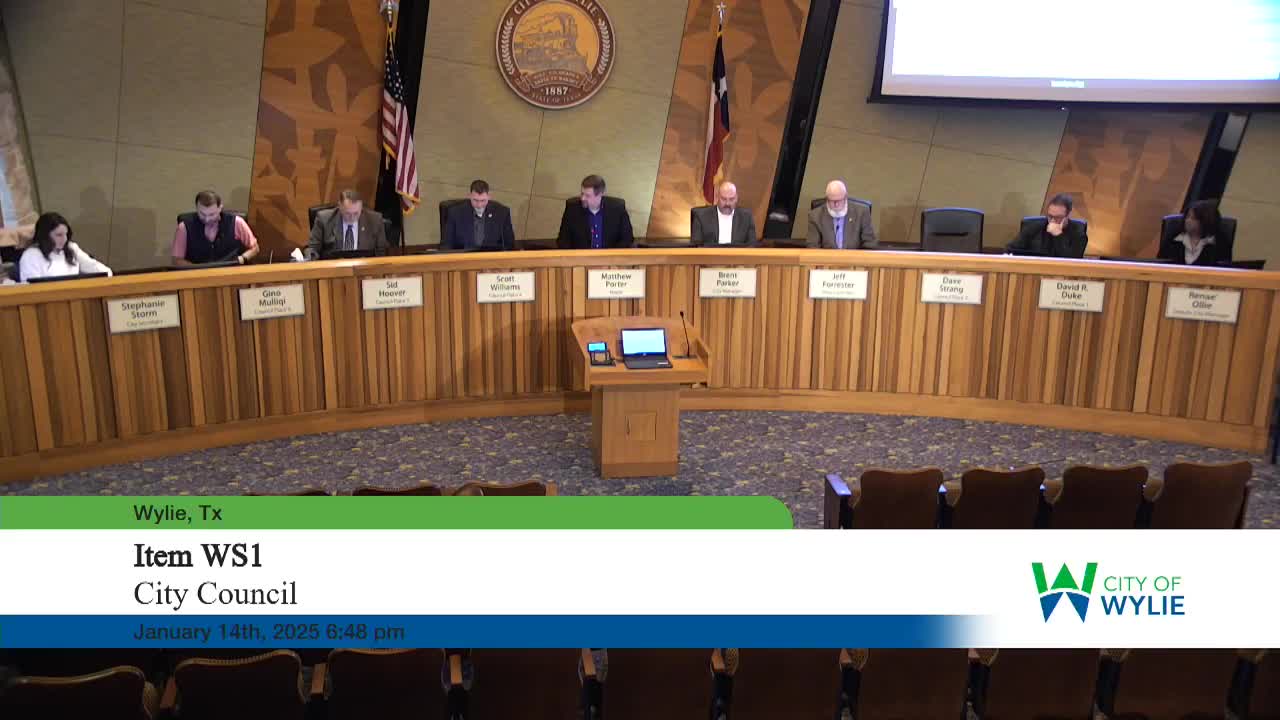Wylie council narrows proposed charter amendments, flags legal risks over candidate ineligibility clause
Get AI-powered insights, summaries, and transcripts
Subscribe
Summary
Wylie, Texas — The Wylie City Council on Jan. 14 narrowed a package of proposed charter amendments and gave staff and the city attorney direction on drafting ballot language to present to voters.
Wylie, Texas — The Wylie City Council on Jan. 14 narrowed a package of proposed charter amendments and gave staff and the city attorney direction on drafting ballot language to present to voters.
During a work session, city staff said they had reduced an initial list of roughly 51 potential amendments to about 25 items the council will consider placing on a future ballot. The council asked staff to prioritize clarity and to group related changes where possible, and instructed the city attorney to draft language consistent with state law for measures that could be combined.
City Attorney Ryan Pittman told council members that one proposed change—language that would render an individual ineligible to run for office or continue serving if they were delinquent in payments owed to the city—“specifically would render as, someone ineligible to run for office and also potentially, cause a person to be, ineligible to continue serving office if he or she were in arrears.” He warned that similar provisions have prompted litigation in other Texas jurisdictions and that courts have often ruled against cities on equal-protection grounds. “That type of provision has been the subject of litigation in Texas and elsewhere,” Pittman said, adding that the city had not received a merits-based, controlling decision but that prior outcomes “have tended to favor a result that is adverse to the city.”
Mayor Pro Tem Jeff Forrester said he would follow the city attorney’s recommendation and withdrew earlier support for the delinquency language. “I would withdraw my comments from prior meetings, and would follow the recommendation from our city attorney,” Forrester said.
Council members also discussed several other proposed changes including: - Replacing gendered language (for example, changing “councilman” to “council member”) and deciding whether to use “they” or “he or she.” - Aligning conflict-of-interest language with Chapter 171 of the Texas Local Government Code so the charter uses the same objective test that state law provides. - Changing the charter’s treatment of abstentions so that an abstention is treated as a negative vote, consistent with state law precedents. - Increasing the charter recodification interval from every five years to closer to 15–20 years (staff cited the last recodification cost roughly $28,000 and took nearly two years). - Updating the charter’s disaster-clause succession language to specify a mixed, rotating list of entities (the school district, the Economic Development Corporation and the Birmingham Land Trust were discussed) to fill emergency governance roles if an extreme event left the council unable to meet. - Adjusting petition and initiative rules (council expressed comfort keeping a 10% signature threshold measured against the number of voters in the most recent municipal election) and lengthening the staff verification period for petitions. - Bringing several publication- and newspaper-related references into compliance with state law and modern practice (for example, adding the statutory phrase that allows publication “by such other means as may be allowed by state law”).
Council members asked staff to draft clear, single-subject ballot propositions consistent with state election rules (Chapter 9 of the Local Government Code limits single-subject bundling) and to make the final propositions available in a way that helps voters understand the changes. Staff and council discussed providing strike-through/redline exhibits as part of ordinance materials and working with the counties involved to make explanatory documents available at polling locations. The council agreed it would likely order the election at its first February meeting.
What the council directed next - Staff and the city attorney will draft proposed ballot language that (a) reduces the full list to a final slate of propositions, (b) aligns conflict-of-interest and abstention language with state law, and (c) removes or rewords the delinquency/arrears eligibility clause because of litigation risk. - Staff will group related newspaper/publication references where legally permissible and prepare exhibit materials that show redlines for voters and for polling locations.
Why this matters Charter amendments change the city’s governing rules and may affect who can run for office, how elected officials declare conflicts, and how local government operates after emergencies. The council repeatedly emphasized the need to avoid vague or subjective language that could create legal exposure or confuse voters.
Next steps City staff will return a draft of the proposed ballot propositions and suggested ballot order to council for approval. Council members said they preferred keeping the propositions in the same sequence as they appear in the charter to minimize voter confusion.
